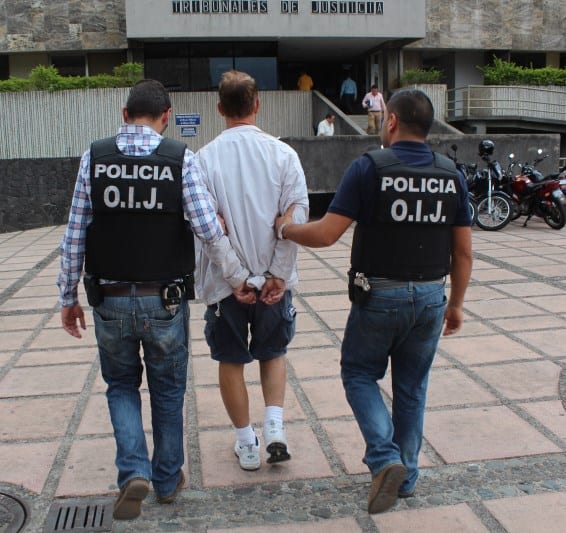Costa Rican judges could set an interesting precedent on Monday when they decide whether or not to charge a 65-year-old U.S. man, David Strecker, under a new and previously untested law that aims to clean up the country’s image as a sex tourism haven.
Strecker, known by his long-time moniker “Cuba Dave,” could face up to eight years in prison for violating a small portion of the 2013 Human Trafficking Law (No. 9095) that states it is illegal for someone to “carry out or promote programs” that project Costa Rica as a destination for sexual tourism or who exploit prostitution for commercial gain.
In Monday’s hearing judges will hear an appeal by Strecker’s attorney challenging his preventive detention. According to a spokeswoman from the First Circuit Court of San José, the hearing will be in front of three judges with a private audience closed to the media on Monday afternoon, in a courtroom downtown.
The Key West, Florida man was arrested on Sept. 4 while attempting to depart Juan Santamaría International Airport just north of the capital. Investigators from the Judicial Investigation Police, who had been following Strecker for nearly a year according to a spokeswoman, confiscated a laptop and a digital camera with pictures of women.
Strecker built his brand through a webpage, YouTube account, and Facebook page, among other networks. His sites were known for offering advice on the legal prostitution scene in Costa Rica and stories of his sexually driven exploits here, mainly the downtown portion of San José known as “Gringo Gulch,” which contains noted bars like the Hotel Del Rey and the Sportsmen’s Lodge.
For the past two and a half months Strecker has been in San José’s San Sebastían jail, one of the country’s most over-populated and deplorable correctional facilities used primarily for preventive detention. His lawyer, Alfredo Núñez, told The Tico Times via email in September that because Strecker is a foreigner, a judge issued a two-month preventive sentence to ensure he didn’t flee the country.
In Costa Rica, preventive detention can be issued by a judge to a detainee charged with a crime while prosecutors gather evidence and build a case for trial.
Because prostitution is legal here, a fierce debate has ensued in the expat community over Strecker’s arrest and possible punishment. Critics of his arrest argue the new law is unconstitutional. He was, after all, publishing blog posts and pictures on his own website with servers registered in the United States.
Article 29 of Costa Rica’s Constitution states that “all individuals may communicate their thoughts via the spoken or written word and publish them without prior censorship; but those individuals are responsible for any potential abuses committed while exercising this right, in cases that become established by the law.”
Former Justice Minister Fernando Ferraro Castro, who sponsored Human Trafficking Law 9095, told The Tico Times in September that Article 29 can be overridden by other laws, depending on how potentially damaging a judge deems speech or writing to be.
“It effectively says that in each investigated case, authorities must try to determine the effect the speech or writing in question has on the society,” he said.
Content on each of “Cuba Dave’s” brand sites was taken down immediately after his arrest.
No comment
Strecker declined multiple requests for an interview by The Tico Times from his jail cell in San Sebastián, and his attorney did not respond to messages left by The Tico Times with an assistant.
Mario Zamora, a former public security minister who also sponsored Law 9095, said that with tourism growth in the country in the past decade, it was imperative to address the negative consequences that followed.
“Apart from the positive elements of increased tourism, conversely, there is a risk that people can offer up Costa Rica as this attraction for sexual services,” Zamora said.
Ferraro said that a country with an economy so dependent on foreign arrivals can’t afford to be perceived internationally as a “theme park” for legal prostitution.
“The country has to protect its image as a tourist destination,” Ferraro told The Tico Times in September. “Obviously to associate it with activities like prostitution, to associate that with the country as a reason for tourism is negative and can affect whether people come here or not.”
But apart from the image, sponsors of the Human Trafficking Law say that unwanted publicity of prostitution can put women working those jobs at risk, while indirectly contributing to an underground network of human sex trafficking in the country.
“More than a matter of the country’s image, it’s a matter of the rights of potential victims who are sexually exploited,” Zamora said.
Another outcome of Monday’s hearing could be that prosecutors request more time to investigate, in which case judges could agree to hold Strecker in San Sebastián for even longer.
“Cuba Dave” is believed to be the first person arrested in Costa Rica under the “Sex Tourism Law,” contained in Article 162 bis of the Human Trafficking Law.






